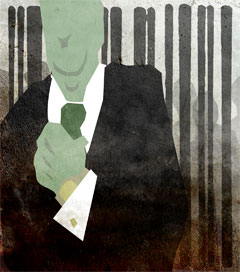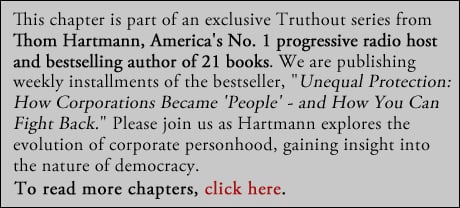Part of the Series
Thom Hartmann | Unequal Protection: How Corporations Became 'People' and How You Can Fight Back
Support justice-driven, accurate and transparent news — make a quick donation to Truthout today!
Consider this August 3, 2001, White House press briefing, in which the editor of Corporate Crime Reporter, Russell Mokhiber, asked a question of White House Press Secretary Ari Fleischer:
Mokhiber: Ari, the Federal Communications Commission requires that if you’re going to have a broadcast license you have to be of sound moral character. So when you make the application, you have to answer whether you’ve ever been convicted of a felony.
They are now going after a gentleman in Missouri who’s been convicted of a felony
Fleischer: Be careful, there are many broadcasters in this room.
Mokhiber: I understand, that’s why I’m raising the question. This gentleman was convicted of a felony, child molestation, and they’re trying to strip him of five radio licenses. On the other hand, General Electric, which owns NBC, has been convicted of felonies, and they’re not being stripped of their license. Why the double standard?
Fleischer: I think you need to talk to the FCC about their standards. That’s their jurisdiction to deal with licensing. [Looks around the room at another reporter] Ron?
Mokhiber: I understand, but generally, does the president have a position on—?
At that point, Fleischer cut off Mokhiber and moved on.
The case Mokhiber cited is not unique. In 1982 a study of America’s five hundred largest corporations reported that “23 percent of them had been convicted of a major crime or had paid more than $50,000 in penalties for serious misbehavior during the previous decade.”1
If Corporations Are Persons, Why Aren’t Their Crimes in the Statistics?
Every year the Federal Bureau of Investigation (FBI) issues a press release on its Uniform Crime Reporting Program, which determines the “Nation’s Crime Index.” It reports crimes by persons—but it excludes corporate persons, even when the corporations have been convicted of felonies. In its entire history, the FBI has never issued an annual report on crimes by corporate persons, although its reports on crimes by human persons are well researched and well publicized. The upshot of this is that when you ask people how most money and property are stolen, or how most people are killed, they think of burglars and muggers and bank robbers and crimes of passion. They think of human persons.
The reality, though, is that more money and property are stolen by or lost to corporate criminals than to human criminals. Mokhiber’s Corporate Crime Reporter notes that in 1998, when the FBI estimated robberies and burglaries at almost $4 billion, the cost of corporate crimes was in the hundreds of billions… as it is every year.
These include:
- Securities scams that ran around $15 billion that year
- Car-repair fraud that hit around $40 billion
- Insurance swindles and corporate fraud found on your health insurance/HMO/hospital billings that runs between $100 billion and $400 billion a year…a hundred times greater than all the burglaries in the country combined.2
Then there are the occasional “really big crimes,” like Neil Bush’s savings and loan scandal that then–Attorney General Dick Thornburgh called the biggest white-collar swindle in history, or the actions of banksters and defense “contractors” that got no investigations whatsoever from either the Bush or Obama administrations.
Deaths from Corporate Actions Are Not Included
More people die as a result of corporate activity than because of the actions of deranged killers or overwrought spouses. According to Corporate Crime Reporter, the FBI reported that 1998 saw about nineteen thousand Americans murdered at the hands of other people. But that same year fifty-six thousand people died from work-related diseases like black lung and asbestosis—that were unreported by the FBI—and many times that number died from “the silent violence of pollution, contaminated food, hazardous consumer products, and hospital malpractice.”3
Much of the human death caused by corporate activity has arguable benefits—for example, the many cancers caused by compounds associated with plastics or pesticides. But the cost of these deaths isn’t factored into the unit cost of the products, so there’s no financial incentive for industry to develop toxin-free or toxin-reduced alternatives, or to use the more expensive but less toxic alternatives that already exist.
This is a process known as “internalizing profits and externalizing costs.” The corporation profits from the toxins, and the public pays for the cancers both in health-care costs and lost productivity from sick and dying workers. It’s been standard operating procedure for centuries and was pushed back against for only a few decades in the 1960s and 1970s after the publication of Rachel Carson’s book Silent Spring.
Since the Reagan administration, however, dumping externalities on the public has become a common and accepted practice. One of the easiest ways to do it is to simply move the toxin-producing or toxin-using factory or process to a country with lax environmental and labor laws, like China or Vietnam, so not only are labor costs lowered but, more importantly, the cost of dealing with externalities like workers’ compensation for injury/exposure and toxic emissions drops to zero or close to it.
And Then There Are the Big Mistakes
In 1998 one of America’s largest meatpacking companies replaced a refrigeration unit on one of its processing lines. Shortly thereafter the detectors it had in place on the line to look for deadly cold-loving bacteria like Listeria monocytogenes started to react, indicating high levels of bacterial contamination.4
The company’s response was immediate. Caroline Smith DeWaal of the Center for Science in the Public Interest told reporters Russell Mokhiber and Robert Weissman, “Then their tests started coming up positive, so they stopped testing.” This company’s Fourth Amendment right to privacy blocked surprise inspections by the government.
The detectors were apparently turned off for a full month before the Centers for Disease Control, frantically trying to find the source of the bacteria that was killing people—mostly children—all over the United States, used DNA fingerprinting to track the bacteria that was causing a national outbreak of Listeria back to the plant, provoking a nationwide recall of a million pounds of product.
But during that month, hundreds of people consuming this company’s products were sickened by Listeria, and twenty-one humans died from it.
The U.S. Attorney’s office, according to Mokhiber and Weissman, “said there was insufficient evidence to bring a felony charge” against the company. Instead the company paid a $200,000 fine and issued an unprecedented joint press release with the Bush administration’s USDA that managed to say that the company had paid the fine without ever mentioning the brand name of the product that had been contaminated and caused the deaths.
Mokhiber and Weissman raised the case at the White House with Press Secretary Ari Fleischer. Here’s the transcript of the interaction:
Question: Ari, has the president expressed a view on the death penalty for corporate criminals—that is, revoking the charter of a corporation that has been convicted of a crime that resulted in death?
Fleischer: The president does not weigh in on those matters of justice. They should not be dictated by decisions made at the White House.
Question: No, Ari, wait a second. Ari, Ari, wait a second. He’s in favor of the death penalty for individuals generally. Is he in favor of the death penalty for corporations convicted of crimes that result in death?
Fleischer: These are questions that are handled by officials of the Justice Department—not by people at the White House.5
The Bush White House never commented further, and the Obama White House’s position seems to mirror that of the Bush administration. And because the FBI doesn’t report on such deaths, or on workplace deaths, it’s hard to know how many deaths every year could have been prevented.
In a Democracy…
The risk to a person who kills another is high: prison and, in some states, execution. But the risk to a corporation of killing people is relatively low, and industry lobbies to keep it that way. For instance, when Congress considered putting criminal penalties into the National Traffic and Motor Vehicle Safety Act, the auto industry lobbied hard against it and won.
As a result, today if a person working as a part-time mechanic in his backyard were to knowingly and willfully repair or build a car for somebody that killed them, he could go to prison for manslaughter or even murder. But if a corporation knowingly and willfully were to repair or build a car that killed a human, it now has a legal exemption. It would face only civil penalties and fines under the act, and none of its human decision-makers would ever be held responsible.
Many human deaths are a result of corporate activities that are permitted by the government—but even deaths that result from corporate felony convictions are not included in FBI crime statistics. In a democracy we can do better.
1. Peter Montague, “New Strategy Focuses on Corporations,” Rachel’s Hazardous Waste News #309, October 28, 1992, https://www.ratical.com/corporations/RHWN309.html.
2. Corporate Crime Reporter, 1998, published by Russell B. Mokhiber, https://corporate
crimereporter.com/top100.html.
4. Russell Mokhiber and Robert Weissman, “Ball Park Franks Fiasco: 21 Dead, $200,000 Fine,” July 26, 2001, for Common Dreams News Center at https://www.common dreams.org.
This material is not covered under Creative Commons license and cannot be published without the permission of the author and Berrett-Koehler Publishers.
Copyright Thom Hartmann and Mythical Research, Inc.
Press freedom is under attack
As Trump cracks down on political speech, independent media is increasingly necessary.
Truthout produces reporting you won’t see in the mainstream: journalism from the frontlines of global conflict, interviews with grassroots movement leaders, high-quality legal analysis and more.
Our work is possible thanks to reader support. Help Truthout catalyze change and social justice — make a tax-deductible monthly or one-time donation today.

